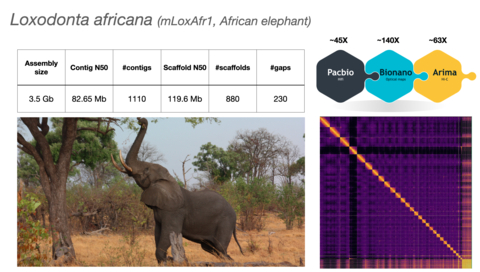DALLAS--(BUSINESS WIRE)--Colossal Biosciences, a breakthrough biosciences and genetic engineering company, and the Vertebrate Genomes Project (VGP), which aims to sequence high-quality reference genomes for all living vertebrates, partnered to successfully generate the first high-quality reference genome of the African elephant. Last year, the partnership announced a near complete sequence of the Asian elephant genome. The sequencing work is part of a long-term effort to ensure the survival of elephant species in the face of climate change, deforestation, and disease. The genome, published in NCBI and public to all, includes sequencing, assembly, and annotation, and introduces a step forward in innovative animal conservation. The project was overseen by Erich Jarvis, Ph.D., a Howard Hughes Medical Institute Investigator and Professor at The Rockefeller University and Chair of the Vertebrate Genomes Project, Olivier Fedrigo, Former Director of The Vertebrate Genomes Laboratory (VGL), and Eriona Hysolli, Head of Biological Sciences at Colossal.
“At Colossal, we believe that purposeful advancements in science are critical to the conservation efforts needed to restore our planet. The partnership with VGP is essential to this larger body of work. Today’s milestone shows how cooperation and advancements in science can ensure that the animals we love and need to have a healthy planet will be with us forever,” said Ben Lamm, Colossal Co-Founder and CEO.
African elephants, along with Asian elephants, are known to be engineers of biodiversity and face a high risk of extinction in the wild. African elephants have decreased by more than 86% over the past 31 years, and the African savanna elephant populations have fallen at least 60% over the last 50 years, according to the IUCN. About 415,000 African elephants of both species combined are left on the continent and will disappear within two decades if urgent action is not taken, the World Wide Fund for Nature (WWF) has warned. The development of high-quality genome assemblies of the African elephant, join the complete and near gapless sequence of the Asian elephant, and ensure all valuable parts of the genomes are captured for long-term species preservation and de-extinction efforts.
“We are excited to produce high-quality reference genomes for the conservation community. A good reference genome is needed to research and study any species,” said Erich Jarvis, a Howard Hughes Medical Institute Investigator and Professor at The Rockefeller University and Chair of the Vertebrate Genomes Project.
The African elephant genome was sequenced using Pacbio HiFi long reads, Bionano optical maps, and Arima Hi-C read platforms to generate the highest-quality genome to date for this species. VGP and Colossal will aim for T2T (telomere to telomere) assemblies for all extant elephant species as the next step towards complete and gapless assemblies. The new African elephant genome is available in NCBI under accession numbers GCA_030014295.1 and GCA_030020305.1.
The third phase of the project will include genetic rescue of the Forest elephant (Loxodonta cyclotis), which is classified as endangered or critically endangered species by IUCN. The VGP and Colossal are seeking help with sample donors to produce a high-quality reference genome of the Forest Elephant.
Today’s news follows Colossal Bioscience’s accelerated efforts to eradicate a fatal disease affecting endangered elephants, Elephant Endotheliotropic Herpes Virus (“EEHV”), the leading cause of death in juvenile Asian elephants born in North America and in their natural range countries. Colossal is leading the development of novel treatments and a vaccine that would prevent the deadly virus from infecting elephants - both in zoos and in their natural habitats.
Since launching in September 2021, Colossal has raised $225M in total funding. The company, which just completed an oversubscribed $150M Series B financing, has announced three species to de-extinct including the thylacine, the dodo, and the Woolly Mammoth - which shares 99.6 percent of its DNA with the Asian elephant.
ABOUT COLOSSAL
Colossal was founded by emerging technology and software entrepreneur Ben Lamm and world-renowned geneticist and serial biotech entrepreneur George Church, Ph.D. Colossal creates disruptive technologies for extinct species restoration, critically endangered species protection and the repopulation of critical ecosystems that support the continuation of life on Earth. Colossal is accepting humanity’s duty to restore Earth to a healthier state, while also solving for the future economies and biological necessities of the human condition through cutting-edge science and technologies. To follow along, please visit: www.colossal.com.
ABOUT THE VERTEBRATE GENOMES PROJECT (VGP)
The Vertebrate Genomes Project (VGP) aims to sequence high-quality reference genomes for all living 70,000+ vertebrates (i.e., mammals, amphibians, birds, reptiles, and fishes), and to use those genomes to address fundamental questions in biology, disease, and conservation. This includes using the genomes to identify species most genetically at risk of extinction, and to preserve the genetic information of life. The VGP produces near error-free and complete chromosomal-level genome assemblies, and has become a model for the broader Earth Biogenome Project, to produce high-quality assemblies of all eukaryotic species. To date, the current VGP pipelines have led to high-quality reference genomes for over 233 species deposited in the public databases (https://www.ncbi.nlm.nih.gov/bioproject/489243), representing the most complete and accurate versions of those species to date, including multiple species at risk of extinction. The VGP 2021 flagship paper and associated publications demonstrates feasibility in quality standardization and scale for the field of genomics. To find more information, visit https://vertebrategenomesproject.org/.
WEBSITE & SOCIALS
Websites: www.colossal.com, www.vertebrategenomesproject.org
Twitter: https://twitter.com/ItIsColossal, https://twitter.com/genomeark
Instagram: https://www.instagram.com/itiscolossal/
LinkedIn: https://www.linkedin.com/company/itiscolossal/
Facebook: https://www.facebook.com/ItIsColossal
Hashtag: #ItIsColossal, #VGP, #GenomicsForAll




